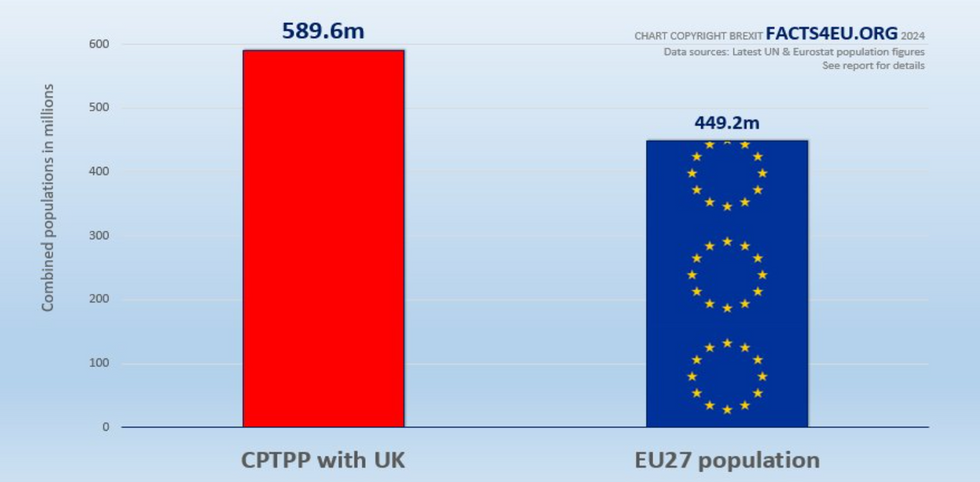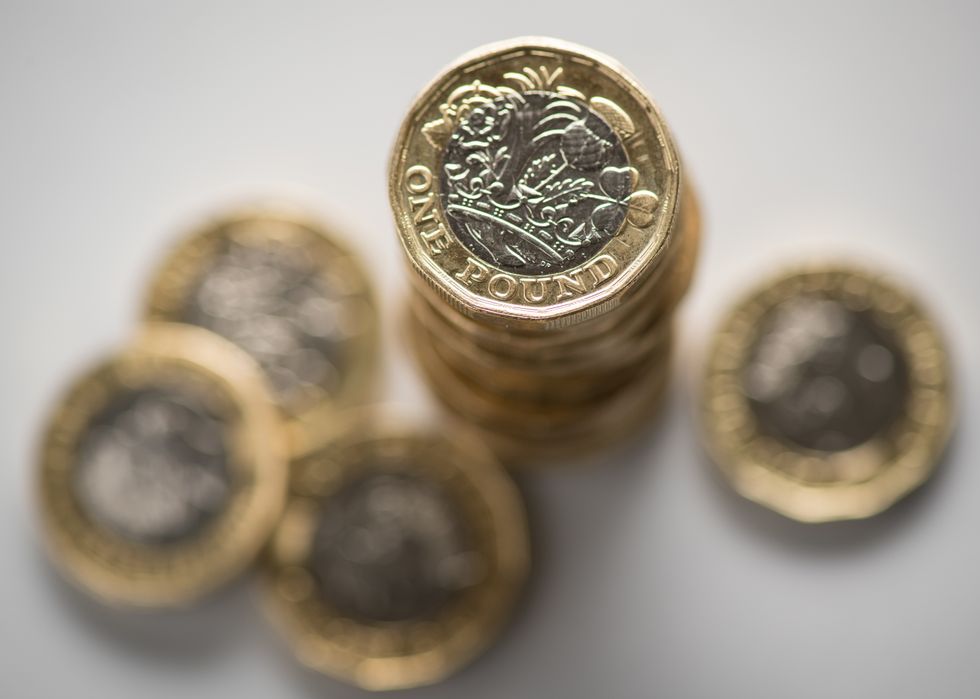Adam Hart
Guest Reporter
Britain has used its Brexit freedom to join a trade bloc 30 per cent bigger than the EU in a massive win for leave over remain.
The UK’s accession to the Comprehensive and Progressive Agreement for Trans-Pacific Partnership bloc (CPTPP) was formally ratified earlier this month, and the true scale of the opportunity is being realised.
The bloc includes massive economies like Japan, Australia and Canada and, as revealed by Facts4EU and GB News, has 590 million more consumers than the EU. That’s 31.3 per cent more than the EU.
Labour has been totally silent on the deal, perhaps understandably as it was achieved by Liz Truss and Kemi Badenoch through the 2020’s when they held the International Trade Secretary role. The BBC has also been remarkably quiet.
Comparing with the EU which many Labour cabinet members campaigned to rejoin, the CPTPP doesn’t just have a larger market for Britain to trade with.
Catherine McBride OBE, a member of the Government's Trade and Agriculture Commission, brilliantly summarised why the CPTPP is superior to the EU, citing six key points.
Unlike the EU, the CPTPP has no desire to be a “regulatory superpower”
The CPTPP has rules that are important for trade, but it is not interested in ‘ever closer union’, nor is it trying to become a federal superstate.
The CPTPP does not see itself as a regulatory superpower – yes, this is how the EU proudly describes itself, as a champion exporter of expensive bureaucracy.
Unlike the EU, the CPTPP does not impose an additional layer of government, a Court, a Parliament, a Commission and officials with bloated salaries, accommodation, pensions and chauffeur-driven limousines.
Most importantly, the CPTPP does not impose tariffs on its members should they choose to import goods from outside the group.
Sure, there are advantages to trading with other CPTPP members but there are no penalties if you don’t. This is quite unlike the EU, which imposes tariffs on non-EU imports.
Joining the CPTPP and having a trade deal with the EU are not mutually exclusive events. The CPTPP does not restrict, tax, or prohibit trade outside the group.
Several of its members have trade deals with the EU – Canada, Mexico and Japan, for example. Anyone claiming that the UK has given up access to the EU’s markets to join the CPTPP is lying.

Benefits of joining the CPTPP for UK consumers and manufacturers
The CPTPP includes some of the world’s fastest growing and affluent markets.
The CPTPP members mostly export machinery, electronics, oil and gas, minerals, and chemicals.
The UK’s export mix is very similar to those of most of the other CPTPP countries except for Australia and New Zealand – where the UK’s vehicle manufacturers will find a market with no local producers, little public transport relative to their land area, and populations dependent on imported cars, trucks, and mining vehicles.
‘Accumulation’ and the CPTPP’s superior rules
Another advantage of CPTPP membership for UK manufacturers is the CPTPP’s process of accumulation.
This means that if your exports are made with materials, parts or semi-finished goods imported from other CPTPP members, then these inputs count as originating material when a product is exported to another CPTPP member.
CPTPP accumulation is important. For example, under the CPTPP rules, if a UK fashion company uses wool or cotton produced in Australia, or cloth made in Malaysia, or manufactures their goods in a Vietnamese factory, these inputs count towards originating material under CPTPP rules so the finished products can be sold in say, Japan or Canada, at the CPTPP preferential tariff rate.
Improved access to world markets for British business
The UK’s manufacturers will have improved access to - for example - semiconductors and circuit boards from Singapore and Vietnam, to Vietnam’s and Malaysia’s clothing and footwear factories and to Malaysian palm oil, to Canada’s wheat and soybeans, to New Zealand’s honey and dairy products, to Australian beef and sheep meat, to avocados from Mexico, to fruit and vegetables from Peru, to apples and pears from Chile, to filleted fish and shelled prawns from Vietnam, and to wine from Chile, New Zealand and Australia.
Many of these items are already imported by the UK from CPTPP countries but joining the CPTPP will simply remove the tariffs and quotas left over from our EU membership or the rolled-over EU trade deals.

UK food safety standards maintained
UK retailers cannot sell food that does not meet UK standards regardless of whether it was produced in the UK or imported – as we have seen with the imported EU horse-meat and other scandals. Joining the CPTPP does not change this.
There have been scare stories on social media claiming that the UK will need to import hormone-treated beef if we join the CPTPP but this isn’t true.
Chile, for example, does not allow cattle to be treated with hormones and it produces enough beef to fill the UK’s very small CPTPP beef quota.
Yes, very depressingly, the UK has put quotas on any CPTPP food that competes with UK products, even though the UK is not self-sufficient in any of them.
The UK has limited beef imports from the CPTPP to 13,000 tonnes per year even though the UK imports about 250,000 tonnes of beef each year.
The UK has limited CPTPP pork imports to only 55,000 tonnes a year even though the UK imports over 330,000 tonnes of pork each year.
The UK has limited CPTPP sugar imports to just 25,000 tonnes a year even though the UK imports over a million tonnes of sugar each year.
Incredibly the UK has limited long-grain rice imports from the CPTPP to just 27,000 tonnes per year even though the UK doesn’t grow rice and imports 750,000 tonnes of rice each year.
So fears of UK farmers being driven out of business by imported food from the CPTPP are simply made up by people who haven’t even bothered to read the publicly available trade document.
For example, both Australia and New Zealand have been limited to the quotas they received in their bilateral trade agreements with the UK so they will not be eligible to use the CPTPP quotas.
And finally, food grows at different times in different climates
The largest food exporters in the CPTPP are either in the southern hemisphere and so produce food in the opposite season to the UK or they are in the tropics and produce foods that can never be grown in the UK climate.
We have all become used to eating summer fruit and vegetables in the winter and many of them will come from Peru, Chile, Malaysia, Vietnam, New Zealand or Australia – all CPTPP members. This benefits UK consumers by lowering prices, without undercutting UK producers because they all have to be imported anyway.
LATEST FROM MEMBERSHIP:

As revealed by Facts4EU and GB News, it took just two years for nimble Brexit Britain to join the bloc, the negotiations for which were driven forwards by previous Conservative governments.
It was former Prime Minister Liz Truss who made the initial application. Commenting exclusively, she said: “Having made the UK’s formal application to join the CPTPP when I was International Trade Secretary, I’m delighted our membership of this vibrant trading bloc has finally been secured.
“Not only does it underline our position as a truly global trading nation, but the bloc also serves as a critical bulwark against China.
“Make no mistake, this was achieved by Conservatives in office - no thanks to the Labour politicians whose tedious attachment to the EU model prevents them from grasping the benefits of Brexit as we pursue an independent trade policy, no longer shackled by Brussels.”
This compares highly favourably to the EU’s joining of the Mercosur trade bloc covering much of South America.
That took over 20 years meaning European bureaucrats have spent over half their working lives negotiating, collecting enormous pensions and enjoying chauffeur driven services on the European taxpayer.
Find Out More...
The UK’s accession to the Comprehensive and Progressive Agreement for Trans-Pacific Partnership bloc (CPTPP) was formally ratified earlier this month, and the true scale of the opportunity is being realised.
The bloc includes massive economies like Japan, Australia and Canada and, as revealed by Facts4EU and GB News, has 590 million more consumers than the EU. That’s 31.3 per cent more than the EU.
Labour has been totally silent on the deal, perhaps understandably as it was achieved by Liz Truss and Kemi Badenoch through the 2020’s when they held the International Trade Secretary role. The BBC has also been remarkably quiet.
Comparing with the EU which many Labour cabinet members campaigned to rejoin, the CPTPP doesn’t just have a larger market for Britain to trade with.
Catherine McBride OBE, a member of the Government's Trade and Agriculture Commission, brilliantly summarised why the CPTPP is superior to the EU, citing six key points.
Unlike the EU, the CPTPP has no desire to be a “regulatory superpower”
The CPTPP has rules that are important for trade, but it is not interested in ‘ever closer union’, nor is it trying to become a federal superstate.
The CPTPP does not see itself as a regulatory superpower – yes, this is how the EU proudly describes itself, as a champion exporter of expensive bureaucracy.
Unlike the EU, the CPTPP does not impose an additional layer of government, a Court, a Parliament, a Commission and officials with bloated salaries, accommodation, pensions and chauffeur-driven limousines.
Most importantly, the CPTPP does not impose tariffs on its members should they choose to import goods from outside the group.
Sure, there are advantages to trading with other CPTPP members but there are no penalties if you don’t. This is quite unlike the EU, which imposes tariffs on non-EU imports.
Joining the CPTPP and having a trade deal with the EU are not mutually exclusive events. The CPTPP does not restrict, tax, or prohibit trade outside the group.
Several of its members have trade deals with the EU – Canada, Mexico and Japan, for example. Anyone claiming that the UK has given up access to the EU’s markets to join the CPTPP is lying.

Benefits of joining the CPTPP for UK consumers and manufacturers
The CPTPP includes some of the world’s fastest growing and affluent markets.
The CPTPP members mostly export machinery, electronics, oil and gas, minerals, and chemicals.
The UK’s export mix is very similar to those of most of the other CPTPP countries except for Australia and New Zealand – where the UK’s vehicle manufacturers will find a market with no local producers, little public transport relative to their land area, and populations dependent on imported cars, trucks, and mining vehicles.
‘Accumulation’ and the CPTPP’s superior rules
Another advantage of CPTPP membership for UK manufacturers is the CPTPP’s process of accumulation.
This means that if your exports are made with materials, parts or semi-finished goods imported from other CPTPP members, then these inputs count as originating material when a product is exported to another CPTPP member.
CPTPP accumulation is important. For example, under the CPTPP rules, if a UK fashion company uses wool or cotton produced in Australia, or cloth made in Malaysia, or manufactures their goods in a Vietnamese factory, these inputs count towards originating material under CPTPP rules so the finished products can be sold in say, Japan or Canada, at the CPTPP preferential tariff rate.
Improved access to world markets for British business
The UK’s manufacturers will have improved access to - for example - semiconductors and circuit boards from Singapore and Vietnam, to Vietnam’s and Malaysia’s clothing and footwear factories and to Malaysian palm oil, to Canada’s wheat and soybeans, to New Zealand’s honey and dairy products, to Australian beef and sheep meat, to avocados from Mexico, to fruit and vegetables from Peru, to apples and pears from Chile, to filleted fish and shelled prawns from Vietnam, and to wine from Chile, New Zealand and Australia.
Many of these items are already imported by the UK from CPTPP countries but joining the CPTPP will simply remove the tariffs and quotas left over from our EU membership or the rolled-over EU trade deals.

UK food safety standards maintained
UK retailers cannot sell food that does not meet UK standards regardless of whether it was produced in the UK or imported – as we have seen with the imported EU horse-meat and other scandals. Joining the CPTPP does not change this.
There have been scare stories on social media claiming that the UK will need to import hormone-treated beef if we join the CPTPP but this isn’t true.
Chile, for example, does not allow cattle to be treated with hormones and it produces enough beef to fill the UK’s very small CPTPP beef quota.
Yes, very depressingly, the UK has put quotas on any CPTPP food that competes with UK products, even though the UK is not self-sufficient in any of them.
The UK has limited beef imports from the CPTPP to 13,000 tonnes per year even though the UK imports about 250,000 tonnes of beef each year.
The UK has limited CPTPP pork imports to only 55,000 tonnes a year even though the UK imports over 330,000 tonnes of pork each year.
The UK has limited CPTPP sugar imports to just 25,000 tonnes a year even though the UK imports over a million tonnes of sugar each year.
Incredibly the UK has limited long-grain rice imports from the CPTPP to just 27,000 tonnes per year even though the UK doesn’t grow rice and imports 750,000 tonnes of rice each year.
So fears of UK farmers being driven out of business by imported food from the CPTPP are simply made up by people who haven’t even bothered to read the publicly available trade document.
For example, both Australia and New Zealand have been limited to the quotas they received in their bilateral trade agreements with the UK so they will not be eligible to use the CPTPP quotas.
And finally, food grows at different times in different climates
The largest food exporters in the CPTPP are either in the southern hemisphere and so produce food in the opposite season to the UK or they are in the tropics and produce foods that can never be grown in the UK climate.
We have all become used to eating summer fruit and vegetables in the winter and many of them will come from Peru, Chile, Malaysia, Vietnam, New Zealand or Australia – all CPTPP members. This benefits UK consumers by lowering prices, without undercutting UK producers because they all have to be imported anyway.
LATEST FROM MEMBERSHIP:
- GB News reporter Jack Carson reveals his favourite scoops from a 'tumultuous year' of news
- A Christmas poem by Sir John Redwood
- Family is the bedrock of British society. The government must protect it - Sally Ann Hart

As revealed by Facts4EU and GB News, it took just two years for nimble Brexit Britain to join the bloc, the negotiations for which were driven forwards by previous Conservative governments.
It was former Prime Minister Liz Truss who made the initial application. Commenting exclusively, she said: “Having made the UK’s formal application to join the CPTPP when I was International Trade Secretary, I’m delighted our membership of this vibrant trading bloc has finally been secured.
“Not only does it underline our position as a truly global trading nation, but the bloc also serves as a critical bulwark against China.
“Make no mistake, this was achieved by Conservatives in office - no thanks to the Labour politicians whose tedious attachment to the EU model prevents them from grasping the benefits of Brexit as we pursue an independent trade policy, no longer shackled by Brussels.”
This compares highly favourably to the EU’s joining of the Mercosur trade bloc covering much of South America.
That took over 20 years meaning European bureaucrats have spent over half their working lives negotiating, collecting enormous pensions and enjoying chauffeur driven services on the European taxpayer.
Find Out More...
